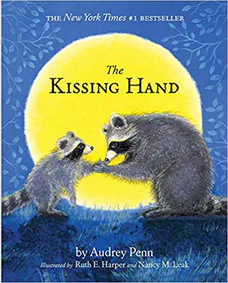The Kissing Hand
Written by Audrey Penn
Illustrated by Ruth Harper and Nancy M. Leak
32 pages
•
Published 1993 (Tanglewood)

Recommended Age Range: Preschool through Kindergarten.
Publisher's Summary:
School is starting in the forest, but Chester Raccoon does not want to go. To help ease Chester’s fears, Mrs. Raccoon shares a family secret called the Kissing Hand to give him the reassurance of her love any time his world feels a little scary. Stickers at the back will help children and their parents keep their Kissing Hand alive.

Dr. Annie's Takeaways
Recommended for: This book is a lovely read for caregivers and their children who have recently developed some separation anxiety or who are anxious about an anticipated separation (e.g., a first day of school). It won’t be enough to fully address significant separation anxiety, but it provides a sweet visualization to help children cope with missing a loved one.
Would a child like it? Many children (and their parents) love this book, and it’s soothed many a nerve prior to separations from caregivers.
Evidence-Based Practices:
Visualization
Tone: Warm and cozy, sentimental
Story Quality: There’s a reason this book is a classic. It’s a warm hug of a book. It’s not funny, or silly, or quirky. It’s soft, earnest, and as predictable as a caregiver returning at the end of the school day.
Illustrations: Pretty, realistic-looking watercolor illustrations of woodland creatures with a touch of anthropomorphism (e.g., the racoons read books and play with human toys).
Representation: Chester is a male racoon. He has a mother racoon, with whom he wants to stay at home in their tree. Chester’s classmates are other nocturnal woodland creatures.
Psychological Practices: This book teaches children a visualization strategy for reminding themselves of a caregiver’s love when they miss them during a period of separation (e.g., while at school). It normalizes feelings of sadness about separation (Chester cries before his first day of school), and it introduces the idea that children can practice feeling a caregiver’s love without them being present.
Concerns: None
